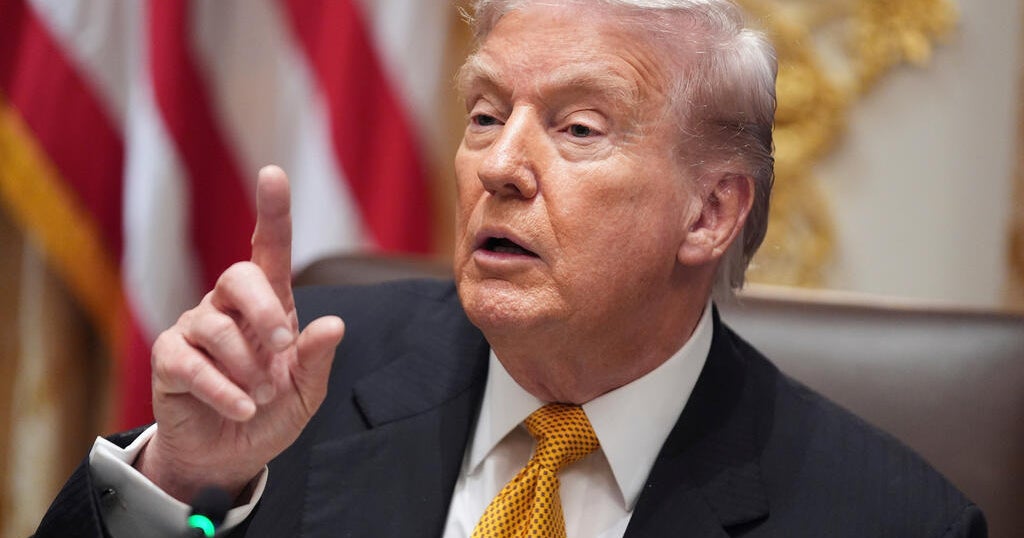
President Trump is hosting a private White House dinner Wednesday with some of Wall Street’s biggest names, as part of his effort to forge stronger ties with America’s business leaders and convince them to invest in U.S. manufacturing.
JPMorgan Chase CEO Jamie Dimon, whose relationship with the president has had its ups and downs, will be attending, as well as Nasdaq CEO Adena Friedman, Stephen Schwarzman of Blackstone, Morgan Stanley’s Ted Pick, BlackRock’s Larry Fink and David Solomon of Goldman Sachs, sources familiar with the event planning said.
Jeffrey Sprecher, CEO of Intercontinental Exchange, which owns the NYSE, helped organize the dinner, according to the sources.
Others who plan to attend the 7:30 p.m. dinner include Citadel founder Ken Griffin, Kohlberg Kravis Roberts co-founder Henry Kravis, Apollo Global Management’s Marc Rowan and SoftBank’s Masayoshi Son, sources said.
Many of those attending have been longtime donors to Mr. Trump, and some, like Son, have announced their companies would make significant investments in the U.S.
Treasury Secretary Scott Bessent and Commerce Secretary Howard Lutnick are on the guest list, too.
Bankers have been pitching the administration on handling the IPO for Fannie Mae and Freddie Mac, which will be a major event on Wall Street. Mr. Trump announced in May that he wanted to take the two mortgage giants public, noting at the time that the two had returned to profitability after the government took them over during the 2008 financial crisis. The two entities buy mortgages from lenders and hold them in their portfolios or package them into mortgage-backed securities to be sold.
Fannie and Freddie are not the focus of the dinner, sources said. Instead, Mr. Trump and top administration officials want to discuss affordability, an issue that Americans said was their top concern in the elections last week, where Democrats swept the major races.
In September, the president hosted more than a dozen tech industry tycoons at the White House, including the CEOs of Apple, Google, Microsoft and Meta. And he’s held one-on-one events in the Oval Office with a succession of tech and pharmaceutical executives, often to announce multibillion-dollar manufacturing deals.
Last month, JPMorgan Chase — the nation’s largest bank in terms of deposits — announced it intends to invest $1.5 trillion over the next decade to support “industries critical to national economic security and resiliency,” including critical minerals, defense technology and artificial intelligence. That represents a 50% increase from the $1 trillion in investments it had planned, the company said.
Mr. Trump often uses Wall Street as one barometer for his handling of the economy. In an interview with “60 Minutes” that aired earlier this month, he touted a recent S&P 500 record.
“We’re doing really well, and everybody knows it,” he said.
But some in the business community have chafed at the president’s policies. Stocks plunged in April when Mr. Trump unveiled hefty tariffs on dozens of countries. Though markets have recovered since then, many economists worry the tariffs could lead to higher prices and slower economic growth.
His pressure on the Federal Reserve to cut interest rates could also clash with Wall Street’s strong preference for an independent Fed, and Mr. Trump has faced pushback from the pro-business Chamber of Commerce over a plan to charge hefty fees for high-skilled worker visas.
Mr. Trump’s relationship with Dimon, who has helmed JPMorgan Chase since before the 2008 financial crisis, has gone through a couple of rough patches. In 2023, Mr. Trump called Dimon a “Highly overrated Globalist,” after he talked up Mr. Trump’s GOP primary rival, Nikki Haley. But the following year, Mr. Trump told Bloomberg Businessweek he had “a lot of respect for Jamie Dimon.”
Dimon cautioned in April that Mr. Trump’s tariffs could slow economic growth, but told CNBC three months later that the tariffs had been “greatly moderated.” He also supported the tax provisions in the Trump-backed One Big Beautiful Bill Act. Earlier this year, Dimon told “60 Minutes” he understood why Mr. Trump won in 2024, and believed people had “legitimate concerns” about issues like immigration. He said that “people wanted kind of more pro-growth and pro-business policies, that they didn’t want to be lectured to on social policies continuously.”
Meanwhile, Mr. Trump signed an executive order earlier this year directing federal regulators to combat alleged “debanking” of conservatives by financial institutions, that is, the refusal of banking services on the basis of “political affiliations, religious beliefs or lawful business activities,” according to the order.
JPMorgan Chase reported this month that it was “responding to requests from government authorities” regarding its internal policies.
